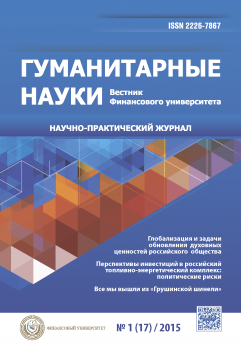Russia’s entry into the large electoral cycle 2016-2018 is actualized the question about political preferences of Russians in General and their regional stratification, in particular. The recent sociological surveys allow us to claim that many ideas about the electoral preferences of macro-regions (both capitals, multi-million-strong city and their agglomerations, regional capitals, small towns, rural areas, etc.), formed on the basis of sociological data and electoral statistics of the 1990s and 2000s, are now undergoing major changes. Concepts and stereotypes, typical of those times are fading into the past, while many researchers in the field of Humanities continue to appeal to them. Currently in Russia there is a change of epochs – to replace post-Soviet, which lasted for 25 years and combines the seemingly opposite of Yeltsin and Putin, or «Putin-1»), comes a new, which has not yet received the trade name. The same time, inherent in their fundamental characteristics, including in the field of political preferences of citizens. The purpose of this article is to give a brief description of the changes taking place in the field of political preferences of citizens with the approximate breakdown of territorialgeographical macro-regions. The study showed that the political preferences of Russians do not conform to the patterns established over the previous two decades, and also have internal contradictions. On the one hand, everything is more explicit request for improvement of quality of life and governance, to fight corruption and other negative phenomena. On the other – there is a lack of faith in own ability to change anything. Hence appears more clearly articulated request for hard hand on the background of the latent discontent with the status quo. While conventionally authoritarian inquiry more characteristic of the inhabitants of Moscow and St. Petersburg, and not the province that breaks the stereotypes. Based on these data we can conclude that the transformation of the socio-political demand of the Russians and the reaction of the authorities it may go the way of several Latin American countries in the last century. On the one hand, demand for justice and change will be met by lipopolysaccha rhetoric and «whipping» members of the upper class (in Russia it may take the form of a struggle against the oligarchs and partial revision of privatization). On the other, it will all happen on the background of tough foreign policy rhetoric that it will find understanding from an external partner, as this rhetoric is for domestic consumption and not be converted to an expansionist foreign policy for lack of resources to implement it.
electoral preferences, elections, socio-political inquiry, quality of life.
1. Dmitriev M.E., Misihina S.G. Izmeneniya v urovne dohodov, potrebleniy, bednosti .i v socialnih zaprosah rossiiskogo naseleniya v 2000-2012 godah [Changes in the level of income, consumption, poverty and social needs of the Russian population in 2000-2012 years]. Uroven zhizni naseleniya regionov Rossii [The standard of living of the population of regions of Russia]. 2013, I. 12, P. 11-27.
2. Mikhail Dmitriev. Evolution of Values and Political Sentiment in Moscow and the Provinces. Putin’s Russia: How it rose, how it is maintained, and how it might end. Washington. 2015. P. 76.
3. Kondratovich I.V. Elitologiya [Elitologii]. Мoscow, 2009, p. 25.
4. Tihonova N. Srednij klass: teoriya I real’nost’ [Middle class: Theory and Reality]. Moscow, 2009, p. 56.
5. Belanovskij S.A., Dmitriev M.E., Misihina S.G., Nikol’skaya A.V. Politicheskie nastroeniya rossiyan v nachale novogo elektoral’nogo cikla (2012-1023 gg.). [The political mood of Russians at the beginning of a new electoral cycle (2012-2013)]. Moscow, Centr strategicheskih razrabotok Publ., 2013, p. 15.
6. Petuhov V.V. Grazhdanskaya aktivnost’ kak al’ternativa antidemokraticheskomu trendu rossiiskoi politiki [Civic Engagement as an alternative to the antidemocratic trend of Russian policy]. Politicheskie issledovaniya [Political Reaserches]. 2013, I. 5, pp. 1-18.
7. Kertman G.L., Patrushev S.V. Doverie: Obschee I chastnoye [Trust: the general and private]. Grazhdanskoye I politicheskoye v rossiiskih obschestvennih praktikah [Civil and political practices in the Russian public]. Moscow, 2013, pp. 31-39.
8. Vorobyeva I.V. Protivorechiya I paradoksi politicheskih orientacii v structure zhiznennogo mira rossiyan [The contradictions and paradoxes of political orientations in the structure of Russian life of the world]. Socis. 2016, I. 1, p. 25.





